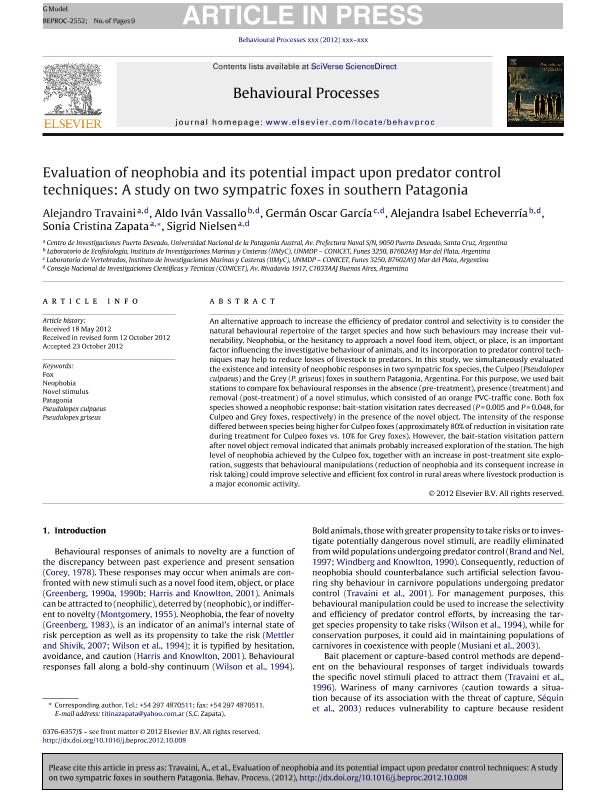Artículo
Evaluation of neophobia and its potential impact upon predator control techniques: A study on two sympatric foxes in southern Patagonia
Travaini, Alejandro ; Vassallo, Aldo Iván
; Vassallo, Aldo Iván ; García, Germán Oscar
; García, Germán Oscar ; Echeverría, Alejandra Isabel
; Echeverría, Alejandra Isabel ; Zapata, Sonia Cristina; Nielsen, Sigrid
; Zapata, Sonia Cristina; Nielsen, Sigrid
 ; Vassallo, Aldo Iván
; Vassallo, Aldo Iván ; García, Germán Oscar
; García, Germán Oscar ; Echeverría, Alejandra Isabel
; Echeverría, Alejandra Isabel ; Zapata, Sonia Cristina; Nielsen, Sigrid
; Zapata, Sonia Cristina; Nielsen, Sigrid
Fecha de publicación:
10/2012
Editorial:
Elsevier
Revista:
Behavioural Processes
ISSN:
0376-6357
Idioma:
Inglés
Tipo de recurso:
Artículo publicado
Clasificación temática:
Resumen
An alternative approach to increase the efficiency of predator control and selectivity is to consider the natural behavioural repertoire of the target species and how such behaviours may increase their vulnerability. Neophobia, or the hesitancy to approach a novel food item, object, or place, is an important factor influencing the investigative behaviour of animals, and its incorporation to predator control techniques may help to reduce losses of livestock to predators. In this study, we simultaneously evaluated the existence and intensity of neophobic responses in two sympatric fox species, the Culpeo (Pseudalopex culpaeus) and the Grey (P. griseus) foxes in southern Patagonia, Argentina. For this purpose, we used bait stations to compare fox behavioural responses in the absence (pre-treatment), presence (treatment) and removal (post-treatment) of a novel stimulus, which consisted of an orange PVC-traffic cone. Both fox species showed a neophobic response: bait-station visitation rates decreased (P = 0.005 and P = 0.048, for Culpeo and Grey foxes, respectively) in the presence of the novel object. The intensity of the response differed between species being higher for Culpeo foxes (approximately 80% of reduction in visitation rate during treatment for Culpeo foxes vs. 10% for Grey foxes). However, the bait-station visitation pattern after novel object removal indicated that animals probably increased exploration of the station. The high level of neophobia achieved by the Culpeo fox, together with an increase in post-treatment site exploration, suggests that behavioural manipulations (reduction of neophobia and its consequent increase in risk taking) could improve selective and efficient fox control in rural areas where livestock production is a major economic activity.
Palabras clave:
Neophobia
,
Novel Stimulus
,
Patagonia
,
Pseudalopex Culpaeus
,
Fox
,
Pseudalopex Griseus
Archivos asociados
Licencia
Identificadores
Colecciones
Articulos(CCT - MAR DEL PLATA)
Articulos de CTRO.CIENTIFICO TECNOL.CONICET - MAR DEL PLATA
Articulos de CTRO.CIENTIFICO TECNOL.CONICET - MAR DEL PLATA
Articulos(SEDE CENTRAL)
Articulos de SEDE CENTRAL
Articulos de SEDE CENTRAL
Citación
Travaini, Alejandro; Vassallo, Aldo Iván; García, Germán Oscar; Echeverría, Alejandra Isabel; Zapata, Sonia Cristina; et al.; Evaluation of neophobia and its potential impact upon predator control techniques: A study on two sympatric foxes in southern Patagonia; Elsevier; Behavioural Processes; 92; 10-2012; 79-87
Compartir
Altmétricas



